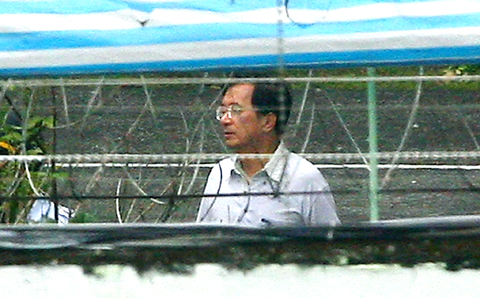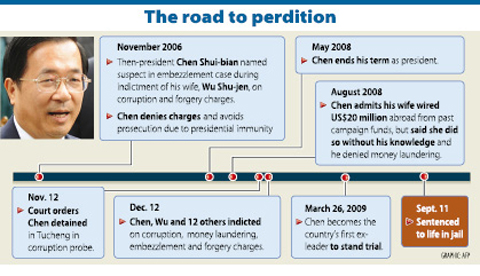The Taipei District Court yesterday sentenced former president Chen Shui-bian (陳水扁) and his wife to life in prison after handing down a guilty verdict in the graft trial against the former first couple and 11 co-defendants.
The verdict makes Chen the first former president in the country’s history to be indicted and convicted.
Presiding Judge Tsai Shou-hsun (蔡守訓) began reading from the court’s 1,000-page verdict at 4pm. Chen received a life sentence, a fine of NT$200 million (US$6.1 million) and had his civil rights annulled for life for violating the Punishment of Corruption Act (貪污治罪條例), Money Laundering Control Act (洗錢防制法) and Criminal Code (刑法).

PHOTO: AFP
Chen chose not to attend yesterday’s proceedings. Lee Ta-chu (李大竹), deputy warden at the Taipei Detention Center, where Chen has been imprisoned since Dec. 30 last year, said that the former president went about his daily activities as usual.
Lee said the former president was calm after finding out about his sentence through TV news.
The court ruled that Chen, during his term as president, “for selfish reasons … used his power to create wealth while putting aside integrity and loyalty to the country.”

The ruling states that as president, Chen should have known that “if one person in power developed a greed for the people’s money, the entire country would devolve into chaos.”
The court found Chen and his wife guilty of embezzlement and taking bribes totaling NT$800 million, some of which was laundered overseas through Swiss bank accounts and paper companies.
Former first lady Wu Shu-jen (吳淑珍) was given a life sentence, a fine of NT$300 million and also had her civil rights annulled for life. The ruling states that although the court was sympathetic toward her disability, as a former legislator Wu “knows the country’s money comes from its hardworking people,” yet “used her position countless times to obtain large amounts of public funds to be used for personal expenses.”
However, because Wu has been in a wheelchair since an incident in 1985 and needs full-time care, she might be allowed to serve out her sentence in an alternative way, such as house arrest.
In the money laundering case, Chen Shui-bian’s son, Chen Chih-chung (陳致中), was sentenced to two years and six months, as well as a fine of NT$150 million, for helping his parents wire money to overseas bank accounts.
Chen Shui-bian’s daughter-in-law, Huang Jui-ching (黃睿靚), was sentenced to one year and eight months and fined NT$150 million on money laundering charges.
Speaking briefly to reporters after hearing the verdict, Chen Shui-bian’s court-appointed attorney Tseng Te-rong (曾德榮) said he found the life sentence “rather heavy,” but declined to comment further, saying that he would first need to read through the entire ruling.
Cheng Wen-lung (鄭文龍), a former attorney for Chen Shui-bian, said the ruling was a “political ruling” because the court handed down a guilty verdict when there was no proof Chen Shui-bian was guilty.
Lin Chih-hung (林志忠), an attorney for the former first lady, said the sentence was too heavy and would advise her to appeal the ruling.
Yeh Ta-hui (葉大慧), an attorney for Chen Chih-chung and his wife, said he would discuss whether to appeal the ruling after he receives a copy of it. However, Yeh said that even if they decided to appeal, the young couple would not change their decision to plead guilty in hopes of leniency.
The Supreme Prosecutors’ Office said prosecutors would decide whether to appeal after they receive a copy of the ruling.
Two former presidential aides, former deputy secretary-general Ma Yung-cheng (馬永成) and former Presidential Office director Lin Teh-hsun (林德訓), were found guilty of helping the former first family embezzle money from public funds and were sentenced to 20 and 16 years respectively and had their civil rights annulled for 10 and eight years respectively.
The court said the former first family’s bookkeeper Chen Chen-hui (陳鎮慧) escaped a prison sentence because she showed remorse for her crimes and provided key evidence to prosecutors and judges, including computer records she kept detailing the former first family’s official and personal expenses.
The former president and his wife were found guilty of receiving kickbacks from a development company to pave the way for the construction of the Hsinchu Science Park by purchasing a plot of land in Taoyuan County from the company at a price prosecutors argued was unreasonably high.
Former Hsinchu Science Park head James Lee (李界木) and Wu’s friend Tsai Ming-che (蔡銘哲) were found guilty of pocketing part of the money and transferring kickbacks to accounts held by family members of Chen Shui-bian and Wu.
Lee was sentenced to six years in prison and had his civil rights annulled for three years. Tsai Ming-che was sentenced to two years in prison and five years probation. His brother Tsai Ming-chieh (蔡銘杰) was also found guilty of taking kickbacks and received a two-year prison sentence and five years probation.
The ruling found the former first family guilty of collecting bribes from contractor Kuo Chuan-ching (郭銓慶) between 2002 and 2003 to help him win a tender to build the Nangang Exhibition Hall. Kuo was sentenced to six months in jail, of which three months have been suspended.
Prosecutors argued that Kuo won the contract by bribing members of a panel organized by the Ministry of the Interior to assess the bidding after then-interior minister Yu Cheng-hsien (余政憲) revealed the list of panel members to Kuo at Wu’s request.
Tsai Ming-chieh and Kuo early last month pleaded guilty to helping Wu obtain US$2.73 million in bribes in connection with a land deal in Longtan (龍潭), Taoyuan County.
Yu has also been indicted for allegedly leaking secrets, but the court has not yet passed a verdict in his case because he is not one of the co-defendants in the Chen Shui-bian case.
BRIBES
The District Court also found Chen Shui-bian and his wife guilty of some of the charges prosecutors added against them on May 5. These include taking NT$10 million in bribes from former Taipei Financial Center Corp (台北金融大樓公司) chairwoman Diana Chen (陳敏薰) and NT$300 million in political donations from former Chinatrust Financial Holding Co (中信金控) vice chairman Jeffrey Koo Jr (辜仲諒).
Members of the former first lady’s family and some of her friends also received prison sentences for helping her launder money.
Wu’s brother Wu Ching-mao (吳景茂) and his wife, Chen Chun-ying (陳俊英), who pleaded guilty to helping the former first lady launder money through overseas accounts, were each sentenced to two years in prison, five years’ probation and a fine of NT$3 million.
Tsai Mei-li (蔡美利), a classmate of the former first lady, is critically ill and has not been sentenced. She allegedly also played a role in the money-laundering schemes.
In related news, the Taipei District Court yesterday said it respected Chen Shui-bian’s decision not to appear in court to hear the ruling. The court’s decision not to require his presence signals that the detention hearing would be held next week at the earliest, or at the High Court if the appeal is processed before the former president’s current term of detention expires on Sept. 25.
APPEAL?
As Chen Shui-bian and his lawyers do not expect a favorable decision from Tsai Shou-hsun, who has repeatedly ruled that the former president should remain in detention, it is expected that Chen Shui-bian’s lawyers would file an appeal as soon as possible.
The former president has denied the charges and says his detention and trial amount to political persecution by the administration of President Ma Ying-jeou (馬英九) and the Chinese Nationalist Party (KMT).
Also See: EDITORIAL: A guilty verdict to scorn
Also See: Chen should be released during appeal: Ma’s mentor

Intelligence agents have recorded 510,000 instances of “controversial information” being spread online by the Chinese Communist Party (CCP) so far this year, the National Security Bureau (NSB) said in a report yesterday, as it warned of artificial intelligence (AI) being employed to generate destabilizing misinformation. The bureau submitted a written report to the Legislative Yuan in preparation for National Security Bureau Director-General Tsai Ming-yen’s (蔡明彥) appearance before the Foreign Affairs and National Defense Committee today. The CCP has been using cognitive warfare to divide Taiwanese society by commenting on controversial issues such as Taiwan Semiconductor Manufacturing Co’s (TSMC, 台積電) investments in the

HELPING HAND: The steering committee of the National Stabilization Fund is expected to hold a meeting to discuss how and when to utilize the fund to help buffer the sell-off The TAIEX plunged 2,065.87 points, or 9.7 percent, to close at 19,232.35 yesterday, the highest single-day percentage loss on record, as investors braced for US President Donald Trump’s tariffs after an extended holiday weekend. Amid the pessimistic atmosphere, 945 listed companies led by large-cap stocks — including Taiwan Semiconductor Manufacturing Co (TSMC, 台積電), Hon Hai Precision Industry Co (鴻海精密) and Largan Precision Co (大立光) — fell by the daily maximum of 10 percent at the close, Taiwan Stock Exchange data showed. The number of listed companies ending limit-down set a new record, the exchange said. The TAIEX plunged by daily maxiumu in just

INVESTIGATION: The case is the latest instance of a DPP figure being implicated in an espionage network accused of allegedly leaking information to Chinese intelligence Democratic Progressive Party (DPP) member Ho Jen-chieh (何仁傑) was detained and held incommunicado yesterday on suspicion of spying for China during his tenure as assistant to then-minister of foreign affairs Joseph Wu (吳釗燮). The Taipei District Prosecutors’ Office said Ho was implicated during its investigation into alleged spying activities by former Presidential Office consultant Wu Shang-yu (吳尚雨). Prosecutors said there is reason to believe Ho breached the National Security Act (國家安全法) by leaking classified Ministry of Foreign Affairs information to Chinese intelligence. Following interrogation, prosecutors petitioned the Taipei District Court to detain Ho, citing concerns over potential collusion or tampering of evidence. The

‘COMPREHENSIVE PLAN’: Lin Chia-lung said that the government was ready to talk about a variety of issues, including investment in and purchases from the US The National Stabilization Fund (NSF) yesterday announced that it would step in to staunch stock market losses for the ninth time in the nation’s history. An NSF board meeting, originally scheduled for Monday next week, was moved to yesterday after stocks plummeted in the wake of US President Donald Trump’s announcement of 32 percent tariffs on Taiwan on Wednesday last week. Board members voted to support the stock market with the NT$500 billion (US$15.15 billion) fund, with injections of funds to begin as soon as today. The NSF in 2000 injected NT$120 billion to stabilize stocks, the most ever. The lowest amount it